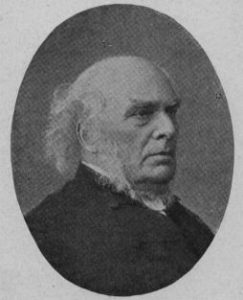Every pastor and Christian leader feels a certain pressure to be relevant. We do not want Christianity to slip away into an oblivion. We do not want the church to go “backward” during our watch. This impulse has led many to the conclusion that Christianity must “keep up with the times.” One of the criticisms I most often hear against conservative Christianity is that we must move with the times. Yet the Scriptures make plain that human efforts are simply unable to make the Christian faith relevant. The vitality of the Christian faith is not up to us.

Believe it or not, we are not the first generation of Christians to face these kinds of struggles. Horatius Bonar (1808–1889) lived and ministered in the throws of the Enlightenment Scotland. It was the Enlightenment that introduced, not only changes to church culture, but changes in theology. It was the Enlightenment that gave birth to theological liberalism as we know it. Theological liberalism was alive and well during Bonar’s day, and he was not about to capitulate to it. Yet he felt its effects. So when he went to publish the Catechisms of the Scottish Reformation (1866)–filled with an old Calvinism many of the theological elites would have frowned upon–he did so with full cognizance of how “out of date” it would seem. So he wrote in the preface, “I wish certainly to preserve [these catechisms]; but not as mere fossils for a museum; not as the footprints of an extinct race; not as relics of an exploded theology, or an obsolete system. I would reprint them because of their genuine and unaltered value, and as embodying truths which are quite as necessary for us as they were for our fathers.”1These quotations and historical background are taken from Michael A. G. Haykin and Darrin R. Brooker, Christ is All: The Piety of Horatius Bonar; Profiles in Reformed Spirituality(Grand Rapids, … Continue reading
For Bonar, the way to be relevant in an age of Enlightenment was not by changing the Christian faith, but by preserving it as God had revealed it. Personally, I believe this means, not only maintaining traditional, Biblical doctrine in our churches, but continuing to uphold the traditional, Biblical ways that Christians have worshipped the Triune God over the centuries of the Church. Part of being a conservative Christian, however, is also having a resilience against theological aberration. In an extended footnote, Bonar addresses the way Christian ministers should approach ministry in the light of massive cultural and philosophical shifts:
Some well-meaning theological literateurs, or rather amateur theologians, who patronize religion in their own way, are fain to warn us of the danger of not ‘keeping abreast of the age,’ as if we are imperilling Christianity by not being quite so learned in modern speculations as they are.
We should like, certainly, to ‘keep abreast’ of all that is true and good, either in this age or any other; but as to doing more than that, or singling out this age as being pre-eminently worthy of being kept breast of, we hesitate.
To be ‘up to’ all the errors fallacies, speculations, fancies, miscriticisms of the age, would be an achievement of no mean kind; and to require us to be ‘up to all’ all this under threat of endangering Christianity, or betraying the Bible, is an exaction which could only be made by men who think that religion is much beholden to them for their condescending patronage; and will only be accepted by men who are timid about the stability of the cross of Christ if left unpropped by human wisdom; and who, besides, happen to have three or four lifetimes to spare.
We may be in a condition for believing, and even for defending the Bible, without having mastered the whole deistical literature of the last century, or the present. We may be qualified to accept the doctrine of sacrificial substitution even though we are not ‘up to’ all that has been spoken against it from Cain to Colenso….
In attempting to ‘keep abreast of the age,’ there is some danger of falling short of other ages; and we are not sure but that the object of those who shake this phrase so complacently in our faces, both as a taunt and a threat, is to draw us off from the past altogether, as if the greater bulk of its literature were rude lumber, a mere drag upon progress. … Old theological terms and Scripture phraseology are set aside, or spoken in an undertone, or used in a loose … sense. Sharp adhesion to old doctrines is imbecility; and and yet defined expression of the new is avoided, the mind of the age being in a transition state, unable to bear the whole of what the exact and honest exhibition of ‘advanced’ Christianity would require to utter.
Many of our young men are more afraid of being reckoned Calvinistic than Platonic; they shrink from bold and definite statements of Reformation doctrine, let they should be pronounced ‘not abreast of the age’–stereotyped, if not imbecile.
Indefinite language, mystical utterances, negative or defective statements, which will save the speaker’s or writer’s orthodoxy without compromising his reputation for ‘intellect’ and ‘liberality’–these are becoming common. Many are doing their best to serve two masters, to preach two gospels, to subscribe two confessions of faith, to worship two Gods, to combine two religions, to grasp two worlds; they would fain be neither very evangelical nor very heretical.
Bonar’s point, though specifically addressing theological trends, is a very good reminder to us in all matters of Christian ministry. Preserving the Christian faith will never be easy. There will always be innovators who would in one way or another undermine the Christian faith. May we be faithful in resisting the trends of our godless age. May we always love and uphold what is good, true, and beautiful–that which transcends any age. We have nothing to fear. The Christian faith we have received is as relevant today as the day the apostles first began preaching it.
References
| 1 | These quotations and historical background are taken from Michael A. G. Haykin and Darrin R. Brooker, Christ is All: The Piety of Horatius Bonar; Profiles in Reformed Spirituality(Grand Rapids, Mich.: Reformation Heritage Books, 2007), 29-33. |
|---|




